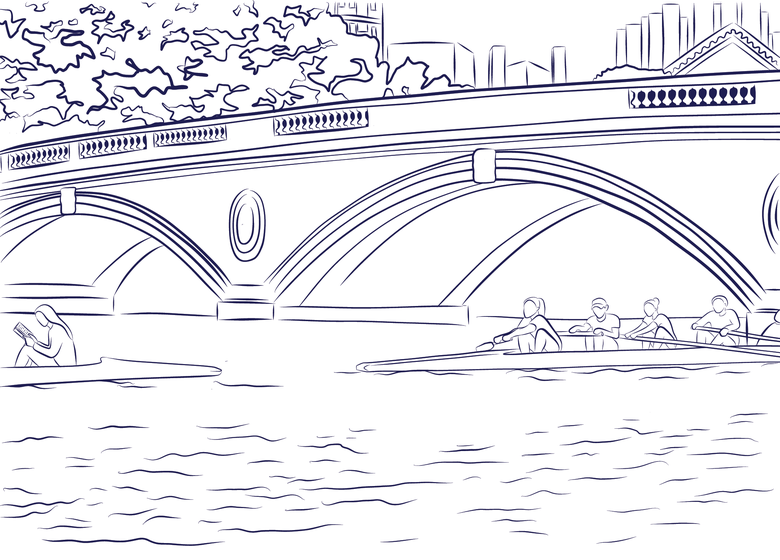{shortcode-91dab4e326bfd59bf35588c37c0ca6cd726fb10c}
It feels strange to start my day so early, at about 5 a.m., because my body takes longer to wake up than my mind does. I am remarkably alert in the morning, but I have to force my legs to pedal my bike through a waking Cambridge, down to the boathouse for practice. I pass service workers in uniform waiting for the bus on Brattle Street and imagine that they may be going to work, or returning home after the night shift.
There is nothing special about this morning routine. It is ordinary to me — everything that I am doing and everything that I am about to do. As we row, it’s a push and a catch, a push and a catch. Within minutes, my body finally catches up. It is so cold. The wind stimulates my nervous system, and suddenly there is a sort of unity between what I want to do and what I am doing. There is nothing else to do other than insert my blade in the water and push.
We push, with our bodies, all the way up the river. If we stopped moving, the boat would stop moving, too. It is a wonderful feeling, to know that my body is strong and capable. I focus on my feet, flat on the footplate, and then the engagement of my thighs, which press once the blade is locked. There is a tug on my latissimus muscles and, at the end of the stroke, an activation of my abdominals as they hold my body upright. My grip on the oar handle is secure. I am intensely aware of my body and its contractions and releases and its relation to other bodies in front of and behind me.
The river opens up about 2,000 meters downriver from Weld Boathouse. Rowers call it the Basin. In the Basin, the Boston skyline sits on the horizon atop Longfellow Bridge. The sky is mostly gray until the sun rises. Then, the horizon glows a pale yellow just before it burns red, or maybe calms with orange and pink. The industrial architecture is first unveiled by a pale light, and the distance afforded to me, on the river, allows for the fleeting feeling that nothing is complicated and moments can just be appreciated as aesthetic experiences.
Two hours later, I’m sitting in the middle row for my 9 a.m. English class. It feels like all that I experienced earlier this morning happened somewhere else. In class, we are reading Charles Dickens’s “Bleak House.” This is the longest novel I have ever read and also one of the most complicated. I am handed a passage from the novel and told to take the next 15 minutes to perform a close reading. The passage is only four sentences.
“For a time there were some dungeon lights burning, as the lamp of life hums in Tom-all-Alone’s, heavily, heavily, in the nauseous air, and winking — as that lamp, too, winks in Tom-all-Alone’s — at many horrible things,” reads one of them.
A close reading is not merely reading. It’s a thoughtful and critical analysis of a text in order to develop a deep and precise understanding of the text’s form in relation to its significance. It is an inspection done by slowing down time to be present with the text. Each word is enthroned with enough power to bear the weight of its paragraph. I find this process one of the hardest tasks in studying literature, because it requires intense stillness and focus. It is difficult for me to summon such isolated attention on command, because most other things in my life do not require this of me.
It all becomes beautiful quickly — the repetition, the rhythm, Dickens’s precise use of language. I decipher. Push and catch, push and catch. I have learned to define inner peace not as stillness in the body, necessarily, but as stillness in the mind. This seems like a rudimentary concept.
We all chuckle at “mindfulness.” I do not know if this is what I am talking about. What I do know is that there is immense value in being present, and being aware of the body and mind, and knowing when one needs rest and the other needs movement. Rowing and studying literature are only different in the physical activity required. What begins to happen when I allow my mind and my body to unify, or become one, repeatedly, everyday, is that both become easy. The world becomes saturated with intrigue and beauty because I am aware enough to see it.
— Magazine writer Isabel T. Mehta can be reached at isabel.mehta@thecrimson.com.


